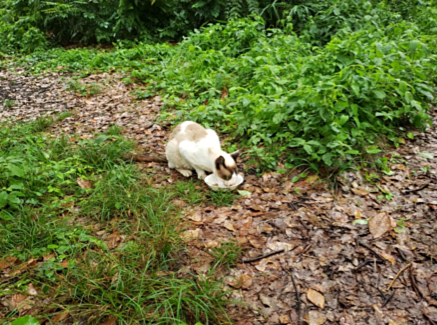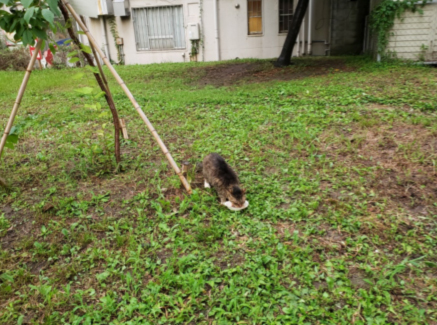Date:2019.8
Kara White
Kara White is an international student from the U.S., who is studying human-animal relations from an Anthropological perspective. She came to Japan under the JET Program after she obtained a Master’s degree from the University of Chicago. After teaching in Tokushima for four years, and spending one year as a research student, she started a PhD at Osaka University from April, 2019.
What are you studying now?
 Stray cat
Stray cat
I’m looking at the relations between humans and stray cats in the urban Kansai area. I am interested in how touch mediates the relationships between people and un-owned cats, how they are located and are allowed to exist within these neighborhoods, and how infrastructure facilitates, or not, interspecies touch.
Why are you interested in cats?
I just really like cats. But of course cats are also interesting in that they tend to be allowed to exist outside of direct human control, for example in the space of a human home, whereas dogs often are not. You don’t see roaming wild dogs generally, or if you do, they are viewed as a dangerous problem to public health. But stray cats are a part of modern urban life. You go basically anywhere in Japan, and there will be stray cats. People are often not afraid of them, they will touch them, pet them, offer them food. There are a lot of interactions happening in these public places, even though these cats are not conventionally thought of as pets. So, stray cats, I think, really complicate the idea of cats as domesticated and owned pets, while also bringing to light complex relationships between organizations, local government, and neighborhood tensions.
Why did you come to Osaka University?
I came initially to learn about the department here as a research student. After teaching for so many years, I was looking for an Anthropology department in Japan that might be relevant to my research. I had heard about Prof. Morita’s work, and after spending time here as a research student, I realized all that the department offered and decided to continue to the PhD program.
Do you think it is easy for international students to handle admission procedures and take classes?
Yes and no. Navigating the Japanese bureaucratic system takes a lot of practice and time to learn. The application process was not so difficult, but the everyday procedures can take a while to make sense of and utilize effectively. Luckily, there is support available within the department and in the Graduate School of Human Sciences, so this is not an insurmountable obstacle by any means.
How do you like the department of Anthropology?
My fellow graduate students are very collaborative, and very helpful. I think that one of the large benefits of this department is that while the department is small, you get a lot of one-on-one feedback from professors. You also get to know everyone really well, and we spend a lot of time reviewing each other’s writing and ideas, which provides great opportunities to grow intellectually and make consistent progress throughout the degree program..

 Stray cat
Stray cat

